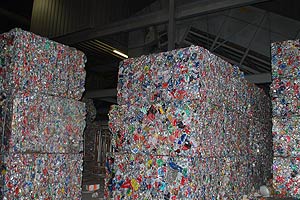 The recyclable aluminum in these packed bundles fetches around $1.50 per pound on the commodities market.
The recyclable aluminum in these packed bundles fetches around $1.50 per pound on the commodities market.
There’s something about recycling that brings out the OCD in me.
A brown paper bag filled with scrubbed-out cans and neatly stacked newspapers; corn husks and coffee filters in a compost tub; a garbage bag so light it barely makes a thud when it lands in the black bin. Things falling into their rightful place. So satisfying!
And yet for all the care we take with recycling (and I know I’m not the only one), much about the process is mysterious to most of us. Why don’t municipal recycling programs pick up plastic bags – even the ones with the chasing arrows symbol on them? What’s the deal with yogurt containers? Or bottle caps? Greasy pizza boxes?
Part of the problem is that these rules change depending on where you live, the result of a schizophrenic system wherein local municipalities contract with private companies or non-profits to design their own, local recycling programs. Berkeley, for instance, declines to recycle most plastic on the grounds that while technically recyclable, plastic is an environmentally unsustainable substance that we should use a lot less of. San Francisco, in contrast, picks up everything from coffee cup lids to plastic buckets and flower pots. (San Francisco was also one of the first cities in the country to start picking up compostable food scraps – which emit methane, a powerful greenhouse gas, when landfilled.)
